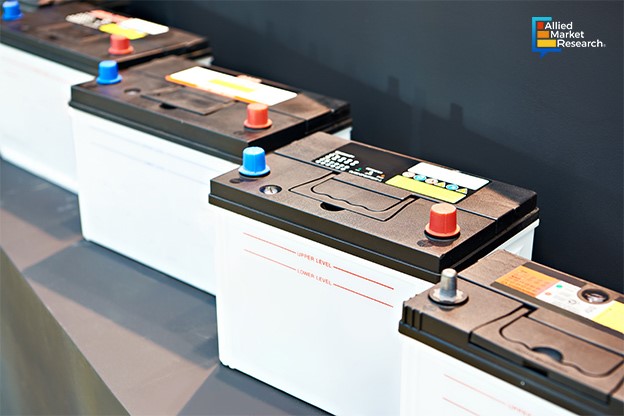Innovative Breakthroughs in Lead-Acid Batteries for Enhanced Industrial Performance

10 Jun
2024
Highlights:
- Evolution of lead-acid batteries
- Latest technological advancements in lead-acid batteries
- Graphene-based lead acid batteries transforming EVs
For centuries, lead-acid batteries have been serving industries with robust energy storage solutions. Despite the emergence of newer battery technologies like lithium-ion, lead-acid batteries continue to play an important role in various industries due to their reliability, cost-effectiveness, and robust performance. In recent years, significant technological advancements have breathed new life into lead-acid batteries, making them more efficient, reliable, and environmentally friendly than ever before.
A Brief Overview of Lead-Acid Batteries
Invented in 1859 by French physicist Gaston Planté, lead-acid batteries are among the oldest rechargeable battery technologies. They work by converting chemical energy into electrical energy through a reversible chemical reaction between lead dioxide (positive plate), sponge lead (negative plate), and sulfuric acid (electrolyte). These days, continuous advancements have enhanced their performance, making them relevant even in today's fast-paced technological world.
Advances in lead-acid battery technology benefitting various industries
Nowadays, many researchers emphasize optimizing electrode designs. They have focused on improving the surface area and conductivity of electrodes, resulting in increased energy density and faster charging capabilities. These innovations have expanded the potential applications for lead-acid batteries ranging from telecommunications to renewable energy storage.
Furthermore, many leading manufacturers are adding carbon to the negative plate increases charge acceptance and reduces sulfation, resulting in better performance in high-rate partial state of charge (HRPSoC) applications. In addition, innovations in grid designs such as the use of advanced materials such as carbon additives and advanced lead alloys, have improved battery efficiency and longevity. These advancements reduce the rate of sulfation, a common cause of battery failure.
These days, the rise of thin plate pure lead technology uses thinner plates, allowing more plates per cell and increasing the surface area for chemical reactions. This enhances the battery's power density and extends its service life. Some manufacturers are exploring 3D printing for battery components, which could lead to more precise and efficient production processes.
Some have emphasized the new formulations of electrolytes to extend the cycle life of lead-acid batteries. The use of gel and absorbed glass mat (AGM) in electrolyte formulations has reduced the risk of spillage, improved safety, and allowed for better performance in various orientations and environments. Furthermore, combining traditional liquid electrolytes with gel or AGM can provide the benefits of both, enhancing overall battery performance and durability.
Additionally, the integration of smart battery management systems (BMS) is another exciting development in lead-acid batteries. BMS technology allows for precise monitoring and control of these batteries, optimizing their performance, and prolonging their lifespan. This level of intelligence ensures that these batteries can meet the increasingly demanding requirements of modern industrial applications, creating massive opportunities in the lead-acid battery industry.
Along with this, the growing concerns about environmental impact have led to the development of eco-friendly lead-acid battery technologies. The batteries are now being designed with improved recycling capabilities and reduced emissions during production and use, aligning with industry regulations and sustainability goals.
Growing use of graphene-based lead acid batteries in modern electric vehicles
Previously, the electric vehicle market has relied heavily on lithium-ion batteries because of their energy density and longevity. However, they include high costs and resource-intensive production. For years, lead acid batteries have been the workhorses of traditional automotive industries, valued for their reliability and lower costs, yet criticized for their weight and slower charge times.
The integration of graphene, a material thinner than human hair yet stronger than diamond, into lead-acid batteries heralds significant performance boosts, potentially overcoming traditional limitations and offering a more sustainable, cost-effective solution. Graphene has superior electrical conductivity which enhances charge rates and battery life. The material not only improves efficiency but also reduces wear and tear, extending the battery’s operational lifespan.
To wrap up, with the growing demand for efficient power back-up solutions across various industries, lead-acid batteries are expected to come out as efficient energy-storage solutions with unmatched reliability and cost-effectiveness. As the world is moving toward a more electrified and sustainable future, these batteries will remain as a component in the energy ecosystem.
To identify new market segments and growth opportunities in the lead-acid battery industry, contact our esteemed analysts here! They will also help you develop new business strategies and initiatives.

Rosy Behera
Author's Bio- Rosy Behera holds a bachelor’s degree in Electrical and Electronics Engineering and now she is a content writer by profession. She loves to portray her thoughts and ideas with a nice command of words. Grabbing an audience with her creative write-ups is one of her biggest assets so far. Apart from writing, she is a certified “Odisi” dancer and has done Gardharva in Drawing, Painting, and Arts. She always explores new things through travel and is a big foodie.
How are Innovations in Line Arrester Technology Helping Power Distribution Companies Deal with Overvoltage and Short Circuits?
Avenue: Entire Library membership of Allied Market Research Reports at your disposal
- Avenue is an innovative subscription-based online report database.
- Avail an online access to the entire library of syndicated reports on more than 2,000 niche industries and company profiles on more than 12,000 firms across 11 domains.
- A cost-effective model tailored for entrepreneurs, investors, and students & researchers at universities.
- Request customizations, suggest new reports, and avail analyst support as per your requirements.
- Get an access to the library of reports at any time from any device and anywhere.
Related Post
-
How are Submarine Cables Transforming Global Connectivity with Enhanced User Experience?
-
Endoscopy Procedures: Transformations in Techniques and Applications
-
AI-Powered Video Analytics: How the Product Actually Works for enterprises
-
Painting Robots: Transforming Precision Coating and Creative Applications
-
Innovations in Pharmacovigilance Systems Advancing Patient Safety
-
Understanding Edge Security: Keeping Data Safe Near the Source
-
Exploring the Use and Advancements of 3D Laser Scanners in Professional Applications
-
Reinforcing Industrial Controls with Smarter Tools and Training








